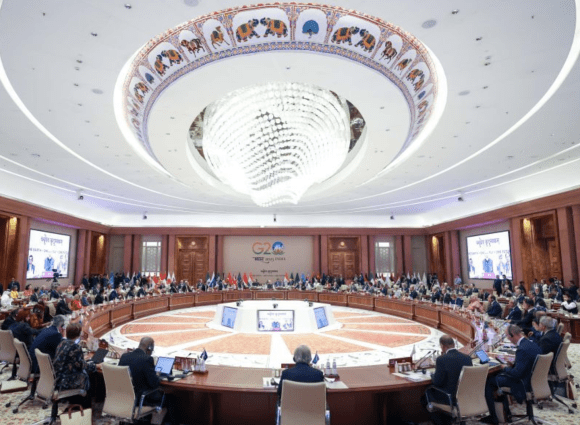The G20 is an effective international forum for economic cooperation that not only attempts at addressing issues pertaining to financial sustainability but also to social development. It brings together leaders and representatives of the world’s largest economies, to collectively address the most significant challenges and propose impactful solutions for the whole world.
For the last decade, this forum has played an instrumental role in addressing the global economic and financial crisis, shaping collective approaches on issues requiring international cooperation.
The International Cooperative Alliance has been participating in the G20 Engagement Groups since 2014, having representatives in different task forces and contributing actively to the discussions and preparation of documents.

Who are the G20 members?
The G20 membership comprises a mix of the world’s largest advanced and emerging economies, representing about two-thirds of the world’s population, 85% of global gross domestic product, 80% of global investment and over 75% of global trade. The G20 is made up of 19 countries as well as the European Union and the African Union that has recently joined along with representatives of the International Monetary Fund and the World Bank.
The 19 countries are Argentina, Australia, Brazil, Canada, China, France, Germany, India, Indonesia, Italy, Japan, Republic of Korea, Mexico, Russia, Saudi Arabia, South Africa, Türkiye, the UK, and the US.
The weight of cooperatives in the economy
Cooperatives have a significant presence in the world’s economy. According to the 2022 World Cooperative Monitor, the top three hundred largest cooperatives and mutuals generate USD 2.2 trillion in turnover. In the European Union, according to a European Commission research, cooperatives hold substantial market shares in several sectors; namely:
- Agriculture – 83% in the Netherlands, 79% in Finland, 55% in Italy and 50% France
- Forestry – 60% in Sweden and 31% in Finland
- Banking – 50% in France, 37% in Cyprus, 31% in Austria and 21% in Germany;
- Retail – 36% in Finland and 20% in Sweden;
- Pharmaceuticals and healthcare – 21% in Spain and 18% in Belgium.
The substantial weight of cooperatives in the global economy makes the cooperative movement a key actor to address economic and social transformation.
What are the G20 Engagement Groups?
The G20 Engagement Groups are independent collectives that represent the civil society and work with other organisations from G20 countries to develop policy recommendations formally submitted to G20 leaders for consideration. Cooperatives mainly engage in:
- Business 20 (B20)
- Civil 20 (C20)
- Youth 20 (Y20)
- Women 20 (W20)
To enhance the participation of ICA members in the G20 Engagements Groups, we have created the ICA Cooperative Working Group. . Its main objective is to bring the cooperative movement's voice to the G20 Engagement Groups through their contribution in drafting policy papers, background materials, and advocacy documents. It also establishes and strengthens partnerships between the international cooperative movement and other G20 countries' stakeholders.
Howard Brodsky, ICA G20 Working Group Chair
G20 Summit in India, 2023
The G20 Summit in India recognises cooperatives’ role in accelerating sustainable development.

G20 Summit in Indonesia, 2022
ICA members, led by INKUR Federation, engage in G20 engagement groups and organised an online side event on the role of cooperatives in building a sustainable economic democracy and an online seminar in achieving the targets of the SDGs.
G20 Summit in Italy, 2021
ICA members, led by Alleanza delle Cooperative Italiane, partiicipated in G20 engagement groups and organised an online side event on the cooperative model as an expression of civil society for the implementation of the 2030 Agenda and its contribution towards economic growth at the same time it reduces poverty and inequality.




